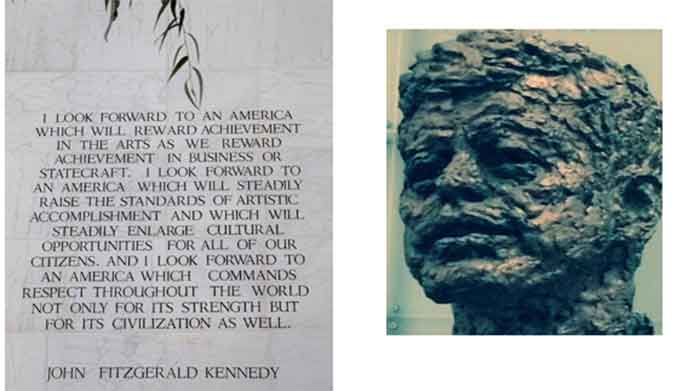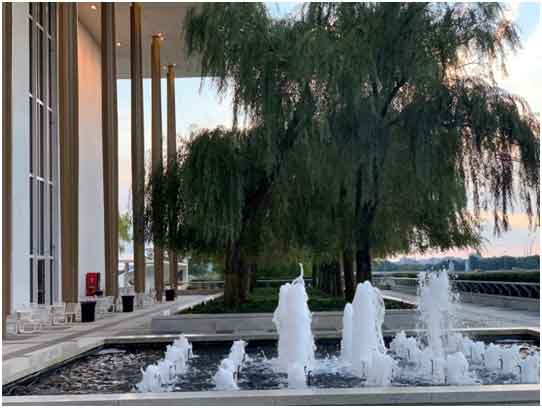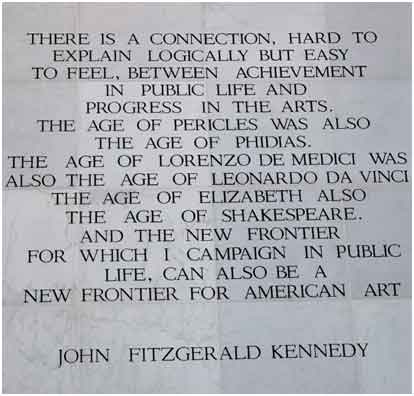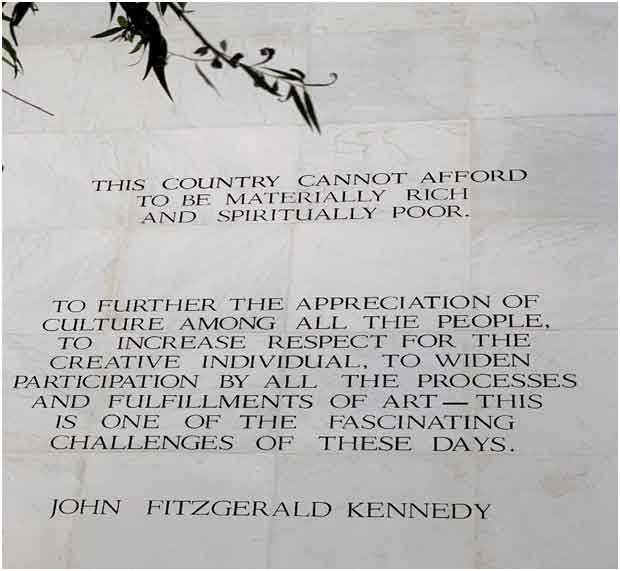
“The President’s been shot!” he shouted, clamoring his way down the stairs in the dorm. The upper-classman!
I was making my way to the third floor, and he was rushing down, letting our small world know—startled, young faces peeping from behind closed doors, aghast and in wonder.
I got to my room, and my 2 freshman roommates were staring at the radio, dribbling out news.
“What…?” I said, and couldn’t finish my thought. “How…?”
And the world changed in an instant—the clattering, rumor-mongering mills churned in our dreams. It would never be the same again…. November 22, 1963….
In about an hour, the deep-throated bells in the watchtower were gonging, gonging, gonging, signaling mourning, mourning, mourning.
“Who…?” I wondered now…. And, more wonderingly, “Why…?”

It’s a place I like to wander to, and wonder about, these past 5 years: the Kennedy Center, posed majestically on a “grassy knoll,” overlooking the Potomac River; the façade of the building inscribed with the words of that doomed soul.
Is it not a wonder to think that we once had a President who could speak wisely, eloquently, about culture and Art?
58 years after that nefarious day in Dallas, how our language, purpose and goals have changed! What president, what politician, what commentator, what “educator,” what “artist” probes the meaning of our lives and “civilization” now?
I was not old enough to vote for him—one had to be 21—and my parents were not politically inclined. But I maintained my 1950’s childhood curiosity….
Not yet a teen, I had stared at the word “HUAC” in the “Daily News.” HUAC—for “House Un-American Activities Committee.” The “House” was investigating American actors, playwrights, “artists” who might be involved in “Un-American” (Communist) activities! “But, how can an American be un-American?” I wondered. “Isn’t that a contradiction?”
My father, the 8th, last child of immigrants, a veteran of the Great Depression and World War II, forced a sad, knowing smile. “Life is full of contradictions,” he said softly.

And he said it again here: “I look forward…”!
Like another hero of mine from those terrible decades, like Martin Luther King, Kennedy dared to imagine–a better world where men and women could be judged, “not by the color of their skin, but by the content of their character.” A world in which “America”—the incarnation of the highest ideals of the “Founding Fathers” and brave, pioneer women—would not “be afraid of grace and beauty.”
And still, this visionary, prods us: after the dust of centuries, we will be remembered—not for battles won or lost, but “for our contribution to the human spirit.”
High talk, inspiring talk—as we almost never hear in these forlorn times….
“Where have all the flowers gone?” Pete Seeger sang….
What is our “New Frontier” now? Sending the masses into space so they can see with their own eyes “the craters of the moon!”—as one gushing actress-politician giggled to her audience of child actors?
As a child, I remember a crowd of people standing in front of a window downtown, Queens, New York. “What’s going on?” my father asked while driving.
“It’s television,” my mother said. “They’re watching a set in the store.”
“What’s tell-a-bizh-on?” my younger brother asked, and we laughed.
Who could imagine the coarsening to come?
“The medium is the message,” McLuhan averred. And we tried to find ourselves among the dancing dots on the screen. And, understandably, without proper guides, we got lost.
“My esteemed colleague on the other side of the aisle,” Senator Dirksen said of Senator Ford. And, “My esteemed colleague…” said Senator Ford of Senator Dirksen. No politician or commentator then alive would dare to condemn half the US population as “a basket of deplorables!”
Not just what is said, but how the package is wrapped and presented shapes our perceptions, molds the generations.
Words can soothe. Words can inspire: thoughtfulness; consideration; higher goals…. Words can inflame: Mr. Hyde, lurking in our souls.
Have we lost civility and common decency?
Before we inundate our children with “critical” “theories,” had we not better teach them how to be friends, how to play, good sportsmanship, respect for “the Other” and for oneself?
Critically, what role have our “artists” played in our negligence? “Aim high,” Thoreau advised; for in the end, we “hit only what we aim at.”
Witnessing the follies of the HUAC hearings, our greatest playwright of that era wrote “The Crucible.” We watched as Arthur Miller catapulted the public back to the horrors of the Salem witch-trials; back to the malignancies of gossip and false accusations. Aiming higher, our artists, educators, commentators, informed and inspired; even elevated some to make their “contributions” to “the human spirit.”
One wonders if humankind can ever achieve the balance that the best philosophers in the East and West, and shamans Down Under and here and there, have always praised? Can we balance the understandable desire to advance oneself in this fleeting world with the need to assist humankind to develop its best side? Can we balance the eternal beauty of Nature with the fluctuations of science and enterprise; can we grasp our New Frontier? Or, will we mourn with Yeats:
“Things fall apart; the center cannot hold;
Mere anarchy is loosed upon the world…
The best lack all conviction, while the worst
Are full of passionate intensity.

In the years that I taught—in an upper-middle class “white” high-school in Massachusetts; in a middle-class junior high in San Francisco; in a “black” junior college in Atlanta; at two prisons in Florida, and in four universities in Florida and Japan—at some point I’d write the word, “education” on the board and ask my students what it meant. They stared at my chalk marks on the blackboard (an ancient way of teaching then!)—as though they’d never seen such a word before!
I took an etymological approach and wrote the Latin root, “ducere” on the board: i.e., “to lead.” And then the prefix, “ex”: “out,” or “out of.”
To lead out of what? Darkness… Confusion… Misunderstanding… Mistrust. The Labyrinth of ideas and ideals, impressions–twisting and turning–imprinted in our minds and hearts from childhood onward….
We are in that Labyrinth now, in this “New Age” that is always old and always new. And they walk with us now—Kennedy and King and the artists and savants–Miller, Richard Wright, Orwell, Huxley, Margaret Mead, Millay, Loraine Hansberry, Maya Angelou, Helen Keller and all those who have cast light on dark, churning waters.
“There is a connection,” Kennedy said, “hard to explain…but easy to feel, between achievement in public life and progress in the Arts.”
Have we progressed in the Arts? Where are the great plays now; where are
our music, novels and Art to capture the angst of this Age? Have we replaced the catharsis of a Sophoclean play, an O’Neil drama, with a cartoon meme? Does the work of a scion of a benighted politician merit the attention of Picasso’s “Guernica” because he has mastered the trick of blowing bubbles of paint through a straw?
“Connection,” Kennedy grappled, “hard to explain…but easy to feel…between achievement …and progress.”
One can’t help but wonder: Can we still “feel” our way to a New Frontier?
The Internet has accelerated our “connections,” while corroding our feelings! We need no longer waste our time, arguing with Socrates in the agora! The meaning of Life? What is Truth? What is Virtue? What makes a good citizen?
We can Google an answer, unload a carton of memes, shoot a meme at our Inquisitor, turn on our TV sets and watch faux “commentators” and mis-communicators hyperbolize the others’ honest doubts, and dehumanize themselves in the process.
Kennedy was inspired by History, heard the great bells swinging back and forth. “Hitch your wagon to a star,” Emerson wrote. And, with similar ebullience, J.F.K. inspired the masses to move forward, to “dream the impossible dream,” to… to…
… to… and dreams were shattered from a “grassy knoll” in Dallas, from a schoolbook depository, from a mail-order rifle! And the lies and the myths and all bedlam have been exploding ever since.
We have replaced “education” with “indoctrination.” Not leading out of darkness, but imprinting one idea or set of values on the mind—not to be examined, not to be questioned.
The Age of Pericles was also the age of Socrates who staked his life and reputation on a sunbeam’s, on a candle’s, light: “The unexamined life is not worth living.”
Isn’t a “theory” something to be proven? The word “critical” can mean “essential,” and it can mean “dangerous” when one is in a “critical condition.” It can mean open to criticism and review. “Critical race theory” is neither “critical” nor a “theory.” It is a replacement of one set of prejudices with another. The inquisitive bias of a Socrates replaced with the inquisitional biases of “educators,” “journalists” and “artists” who blow smoke in our eyes and bubbles of paint through straws!
A real examination of “history” entails the varying factors that define an age, era or epoch. A simplistic approach is faux history, faux science, faux life.

These are a few of the awful and profound challenges we face in our inner and outer worlds!
In the confounding Industrial Age of Empires and Wars, the poet, O’Shaughnessy wrote:
“… each age is a dream that is dying
Or one that is coming to birth.”
In a more hopeful time, in the blossoming of the “Romantic” era, Coleridge defined poetry as “the reconcilement of opposites.”
Can we reconcile the opposites? Reconcile an individual’s striving for the best and highest goals for oneself, one’s family, one’s group with a nation’s, a region’s, a world’s need for peace and order to survive and thrive?
More recently, but really only yesterday, Robert Frost, a poet who read at Kennedy’s inauguration, reminded us:
“’Men work together,’ I told him from the heart
‘Whether they work together, or apart.’”
Gary Corseri is the grandson of Ukrainian-Jewish and Sicilian-Catholic immigrants. He has performed his poems at the Carter Presidential Library and his dramas have been produced on PBS-Atlanta and in universities, high schools and Little Theaters. He has published 2 novels, 1 full collection and 1 prize-winning chapbook of poems. His poems, articles, fiction, dramas have appeared in hundreds of global publications & websites, including: Countercurrents, Village Voice, Redbook Magazine, Miami Herald, The New York Times, and Transcend Media Service. He has taught at universities in the U.S. and Japan, and in US prisons and public schools. He has worked as a grape-picker in Australia, a gas-station attendant, and an editor.
All pictures by Gary Cor
Related posts:
Related posts:
Views: 0
 RSS Feed
RSS Feed

















 November 18th, 2021
November 18th, 2021  Awake Goy
Awake Goy  Posted in
Posted in  Tags:
Tags: 
















